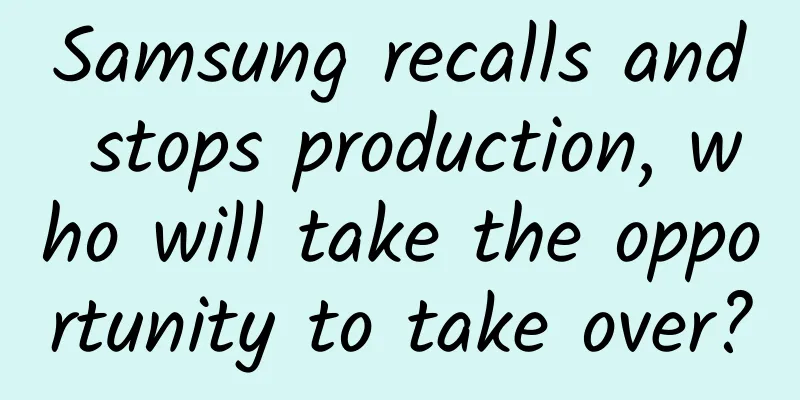Samsung recalls and stops production, who will take the opportunity to take over?

|
After a month of struggle, Samsung finally announced the suspension of production and sales of Note7. In mainland China, it also changed from insisting that there were no safety issues to announcing the recall of all Note7 phones sold. Facing the crisis, Samsung performed very poorly this time. In the early stage of discovering the problem, Samsung did not immediately stop sales, but hastily investigated the cause of the problem and made hasty conclusions and solutions. As a result, the explosions continued one after another, and Samsung's public relations made a very wrong choice, pointing the finger at other manufacturers, but the fact is that even if other manufacturers fanned the flames, it was your own product that had problems in the first place. If your own problems are not resolved, they will continue to become a hot topic in the media. Now, Samsung has finally recalled the phone under pressure from all sides, so who will be the successful replacement for Samsung? Does Samsung still have a chance in the Chinese market? 1. Samsung’s rise and fall in the Chinese market Samsung has been cultivating the Chinese mobile phone market for a long time. As early as the black and white feature phones, Samsung had already entered the Chinese market. At that time, Samsung pursued high added value, and Samsung was not behind in dual-screen mobile phones, MP3 mobile phones, women's mobile phones, and color screen mobile phones. Samsung's rise can be summarized into several successful strategies. First, we should grasp the psychology of consumers at the beginning, pay attention to workmanship, technology, gimmicks, and advertising and marketing. When we have no technical advantage, we should promote niche products such as A388 dual-screen mobile phone and A408 female mobile phone. The second is vertical integration, which is to apply the advantages of its IT industry to mobile phones. M188 combines its flash memory technology, and T108++ combines its accumulation in screens. To make camera phones, Samsung has its own lenses and CMOS. To make smartphones, Samsung develops its own processors and has its own semiconductor factories. Samsung makes almost all the accessories for smartphones, which gives Samsung mobile phones a great advantage in the competition. Third, Samsung has adopted a product strategy of "shooting at the bit", and in terms of product development, it will develop a large group strategy. As long as there are similar products on the market, it will test them. If it is unclear about the direction, it will do it all. No matter how the market changes, Samsung will always keep up. The fourth is the tactic of concentrating superior forces to attack breakthrough points. This is actually in line with the strategy of hitting the target regardless of whether there is a breakthrough or not. After a round of attack, if a breakthrough in the market is found, concentrate resources to bombard it. These advantages made Samsung very popular in the smartphone market in the past few years, and it once reached the top of the world. Around 2013, Samsung also reached its peak in the Chinese market. In 2013, Samsung and Apple had a market share of 31% in China. At its peak in 2013, Samsung had two types of products: official products and parallel imports. Official products were priced high to build up its image, while parallel imports were sold through informal channels to boost sales. In 2013, Internet phones represented by Xiaomi, Huawei Honor, and Coolpad Dasheng began to rise rapidly. Samsung's star low-end models use a low-spec and low-price strategy, and the experience is far behind Internet phones of the same price. As a result, Samsung's low-end and mid-range products were gradually eliminated after 2013. By 2015, Samsung's market share was less than 8%. In the latest market share survey of D.Phone, Samsung's market share was only 6%. However, Samsung's 6% and 8% are very valuable, and they are all high-end products with a price of more than 3,000 yuan. Although the gap between Samsung and domestic brands of mobile phones is very small in terms of experience, Samsung's accumulation in brand and channels still allows it to obtain a satisfactory premium. 2. Who is the beneficiary of Samsung's incident? Before the Note7 incident, Samsung mainly occupied the high-end Android market in China, targeting business users and fashion users. When Samsung encountered problems, it also gave up the high-end market, and low-end Internet phones had no chance to replace it. In terms of product positioning, due to the demise of competitors, the only product with the same price as Samsung is the Apple iPhone. When Samsung's Note7 had problems, the Apple iPhone7 was released. Apple was the biggest beneficiary. Apple was originally in a slump, but Samsung's help gave Apple an opportunity in the fourth quarter of 2016. Foxconn has already recruited workers to expand production to cope with the Christmas season. Apple will benefit a lot in one or two quarters. Samsung's business users will be divided by Huawei and Gionee. Huawei has been eyeing the market of male business users since the P7 "Gentleman Like Orchid"; Gionee's M series first plays the card of long battery life, and then adds security encryption chips to highlight security. Once Samsung falls, Huawei and Gionee will have a chance. OPPO and vivo are already very competitive in the fashion and female user segments. OPPO and vivo also like to use Korean stars to endorse their products. Moreover, their channels and advertisements are all at the master level. Samsung also faced fierce competition when it was not in trouble. Now that Samsung has collapsed, OPPO and vivo have intensified their competition. Vivo has just cooperated with the NBA, and OPPO will release a new phone next. Samsung will lose a lot of market share in one or two quarters. 3. After the explosion incident, does Samsung still have a chance? Historically, many brands have experienced recalls of certain product models due to major defects, and most of the impacts were short-term. There are only a few manufacturers that were completely wiped out by a single accident like Sanlu milk powder. However, Samsung does not only have smartphones as its business. Starting from home appliance manufacturing, Samsung has entered into multiple fields, extending to the upstream and downstream of the industry, and directly targeting the core technology of the electronics industry. Samsung mastered semiconductor manufacturing technology and cathode ray tube manufacturing technology very early, and later introduced Japanese technology to develop LCD panel manufacturing technology, and surpassed Japan in the OLED era. Samsung has its own processors, its own LCD panels, its own storage, and even its own Cmos and its own lenses. In the electronics industry, Samsung is involved in almost every corner. In addition to the electronics industry, Samsung also has heavy industry, motors, engineering, aerospace, military industry, real estate, insurance... South Korea's fighter jets are all made by Samsung, and the recall of a mobile phone product will not cause any serious damage. However, the current news is that Samsung is accelerating the launch of S8. It should be noted that the problem with Note7 is closely related to its early launch (before the release of iPhone7). If Samsung S8 has problems again, it will be a big trouble. The suspension and recall of Note7 is paying the price for past mistakes. What Samsung needs to do is to "keep its footing and deal with it calmly", not make further mistakes, ensure the quality of S8 and future Note8, pay special attention to battery safety, and learn lessons in public relations response and crisis management. One mistake is not terrible, what is terrible is making mistakes repeatedly. As long as Samsung can keep calm and not make any stupid moves (such as the S8 having problems again due to insufficient testing), this incident will not cause long-term impact. As a winner of Toutiao's Qingyun Plan and Baijiahao's Bai+ Plan, the 2019 Baidu Digital Author of the Year, the Baijiahao's Most Popular Author in the Technology Field, the 2019 Sogou Technology and Culture Author, and the 2021 Baijiahao Quarterly Influential Creator, he has won many awards, including the 2013 Sohu Best Industry Media Person, the 2015 China New Media Entrepreneurship Competition Beijing Third Place, the 2015 Guangmang Experience Award, the 2015 China New Media Entrepreneurship Competition Finals Third Place, and the 2018 Baidu Dynamic Annual Powerful Celebrity. |
Recommend
KMC Knowledge and Experience Extraction Online Training Camp, valued at RMB 4999
KMC Knowledge and Experience Extraction Online Tr...
What should I do if I encounter negative reviews in the Apple App Store? Use these 6 methods to help you solve the problem!
Those who do operations are afraid of encounterin...
Baidu bidding promotion, what types of advertisements are there in Baidu bidding promotion?
Today, let’s talk about how many types of ads the...
There is no public domain traffic in the world
2020 is also known as the "first year of the...
5000 words to analyze the philosophy of planting grass when browsing Taobao!
It’s Double Eleven again this year. At 0:00 on No...
Yiche.com: BYD occupies seven of the top ten domestic car sales in August 2024
Yiche.com compiled a sales ranking of domesticall...
Bilibili barrage conquers Taobao: the strong penetration of otaku culture
When I opened Taobao on the morning of December 1...
Why is it said that "a history of Henan is half of the history of China"? Because archaeological discoveries here are "Taizhong"!
In the Chinese civilization origin exploration pr...
How to improve your user operation system? Here are 4 ways
We can think of the user operation system as a bi...
How to create a hit title with over 100,000 views? Just master these 5 points!
Let’s take you to re-examine the meaning of title...
The global EV battery market is expected to reach $67 billion in 2025
According to foreign media reports, a market rese...
Is live streaming the lifeline for brand marketing?
Whether it is the product side or communication w...
5 major trends in brand marketing in 2021
Among the top ten popular slogans, Yuanfudao (A t...
Sharing tips on operating Xiaohongshu and becoming popular
As a grass-growing and sharing platform commonly ...
It's scary to think about it! Water drips from trees on hot days. What is this unknown slime?
Every summer, especially in midsummer, you can he...









